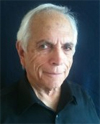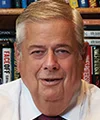 Joe Honick Joe Honick |
It is a sad and worrisome reality that Russia’s Vladimir Putin plays the egocentric U.S. President as though the former were a symphony violinist, and the latter a melody.
It also should not be forgotten that The Economist in its editorial last September — under the headline “Art of the Lie” — asserted that “Politicians have always lied. Does it matter if they leave the truth behind entirely?”
Continuing, “Consider how far Donald Trump is estranged from fact. He inhabits a fantastical realm where Barack Obama’s birth certificate was faked, the President (Obama) founded Islamic State, the Clintons are killers, and the father of a rival (Senator Cruz) was with Lee Harvey Oswald before he shot John F. Kennedy.
“Mr. Trump is the leading exponent of ‘post truth’ politics … a reliance on assertions that ‘feel true’ but have no basis in fact.”
These comments were made before Trump's election, courtesy of the Electoral College but not a few million voters who, right or wrong, did vote more popularly for Hillary Clinton, a reliable fact to which President Trump simply cannot let go, as he continuously reminds us. With massive challenges facing him from domestic economics and racial conflict to international disputes over walls and trade, he spends time daily as the new American leader disputing the size of his inauguration crowds and strikes out at the media for failing to note recent ovations and words of praise.
What does any of this have to do with the Russian leader? A lot!
Far more effectively than most editorialists in any media from whom the President seems in continuous combat, Putin learned early how to play to Trump’s endless need for praise and respect.
It’s no accident that the two speak so respectfully of each other. Of course, even if all this did not exist so conspicuously, it would be advantageous for all if such powerful leaders could find ways and means to get along. What’s at stake, however, is what we may surrender politically, economically and militarily in the process. Already, there’s discussion from our end of reducing or even ending current sanctions that exist. Putin's target doesn't even realize what's happening.
As The Economist September commentary continued: “When politics is like pro-wrestling, society pays the cost.”
As noted, Vladimir Putin figured President Trump out even as a candidate when he couldn't stop slandering opponents who had the chutzpah to challenge him. No doubt the Russian leader’s history as KGB director and the talents implicit in such an assignment made him all the more sensitive to these issues.
It’s not at all overlooked by many here and abroad that, had Obama, Clinton or even either of the Bushes sidled up so warmly to anything Russian, they would've been harshly criticized by political opponents and the media.
For professionals in the public relations and propaganda worlds, these realities should be as instructive as they are extremely worrisome in the minds of political analysts. Just one inexcusable Trump miscue, when he compared his intel community with Nazi Germany, may well have “infected” not only their relationship with the president but diluted what risks they might avoid in frankly advising him on critical issues.
Unless the President’s closest advisers can either cure him of his egocentricity or get him to stop focusing on personal anxieties, the nation and the world could be dangerously affected by how such problems impact his decisions.
Meanwhile, there can be no question that both The Economist editorialists and Putin long ago figured out what and how to do with Trump. They saw a man who fell in love with his own voice when echoing the isolationist words of Charles Lindbergh and his America First partisans who believed America should remain aloof from a German dictator committing a Holocaust in order to think only of ourselves.
Vladimir Putin is struggling to refrain from laughing out loud.
***
Joseph J. Honick is president of GMA International in Bainbridge Island, Wash.


 The ridiculously high prices Americans are paying at the supermarket might influence how—or if—they vote in November.
The ridiculously high prices Americans are paying at the supermarket might influence how—or if—they vote in November. At a moment in history when there are so many conflicts among peoples here and abroad, let us put our differences aside and celebrate this wonderful season in a spirit of togetherness.
At a moment in history when there are so many conflicts among peoples here and abroad, let us put our differences aside and celebrate this wonderful season in a spirit of togetherness. The news announcing the death of Henry Kissinger, the last of the prevaricating politicians and so-called statesmen who stole my future and that of thousands of other young Americans, got me thinking about Walter Cronkite.
The news announcing the death of Henry Kissinger, the last of the prevaricating politicians and so-called statesmen who stole my future and that of thousands of other young Americans, got me thinking about Walter Cronkite.


 Have a comment? Send it to
Have a comment? Send it to 
No comments have been submitted for this story yet.